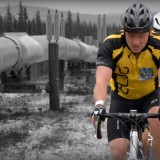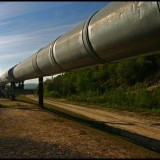A version of this article first appeared on the website of Strategic Culture Foundation, a Russian online paper.
Let me explain the title to this article. Canada’s overriding mission, according to its constitution. is “Peace, Order and Good Government”, yet I see violence ahead and It’s all about the Tar Sands in Alberta, the worst polluting project in the world, and proposed pipelines from them to the British Columbia ports of Kitimat and Vancouver.
As an inseparable companion is the Keystone XL pipeline from the Tar Sands to Houston, Texas.
Sniffing anxiously around is China which has $75 BILLION invested in the oil pit.
It must be noted that in the middle of the mess that’s a-brewing are First Nations, who, in contradistinction to many aboriginals elsewhere, carry a lot of legal weapons arising out of Supreme Court of Canada decisions and their rights to unceded territories in BC, and it may be within that power that they can stop pipelines – and their stated goal is to do just that.
The proposed pipelines to Kitimat through BC will be sited through one of the last real wilderness areas in the world. There are two pipelines – one to carry the Tar Sands gunk, officially called bitumen, and the other to take back to Alberta the condensate which is mixed with the Bitumen to allow it to flow through the pipeline. Enbridge, the pipeline company, has an appalling record on spills and time taken to respond.
Of huge importance is the shipping of this gunk down the coast of BC, arguably the prettiest and most treacherous coast in the world.
First Nations, plural, have unceded land where they have traditionally fished and hunted for centuries. All along the pipelines and down the coast the various nations have said, “no way”. And as to the tanker traffic, the huge Exxon Valdez spill in 1989 remains burned in their memories.
Meanwhile, on the south coast of BC, another pipeline battle is mounting around KinderMorgan’s plans to turn Vancouver into a major shipping port for the Tar Sands. The company wants to boost the existing Trans-Mountain Pipeline, designed to supply the Lower Mainland with oil for local uses, from 300,000 barrels to 700,000 barrels a day, with hundreds of Suezmax tankers shipping toxic bitumen through the Salish Sea en route to Asia and the United States.
The stakes of this issue were ratcheted up a notch when the First Nation in whose traditional territory the pipeline terminates and the tankers depart from – the Tsleil-Waututh (“People of the Inlet”) – took a strong stance against the expansion of this pipeline and tanker traffic through their waters.
Up until recently, KinderMorgan may have figured it was going to slide its pipeline under the radar, while protests raged against Enbridge and TransCanada (the company behind the Keystone XL). But it looks very much now as though they won’t be so lucky.
Hanging over these proposals is the uncomfortable truth that spills from the pipelines and tankers are not a threat but a reality waiting to happen. On the tanker issue, for example, Environment Canada, scarcely full of Greenies, says that there will be a spill of 1,000 barrels every four years and a 10,000 BBL spill in 9.
Here’s the chilling fact: not only are the spills a certainty, no matter what size the spill the damage will be horrific. The Enbridge pipeline passes through Caribou feeding grounds and over and through a great many fish bearing rivers and streams including three major salmon spawning rivers.
I would suggest readers go to this site to see the Enbridge spill into the Kalamazo River in Michigan and note that Enbridge’s record on this spill is typical and it hasn’t been cleaned up 15 months later (and never will be). Remember, this spill happened in a populated area, not the wilds of British Columbia.
Let’s take a look at the Keystone XL pipeline to Houston. Readers have no doubt read about the rallies including movie stars in front of the White House. President Obama has postponed the decision until 2013.
Here’s the crunch – this postponement means that huge pressure now will be mounted against by the government of Canada and within hours of the President’s announcement the Canadian Minister of Finance, Jim Flaherty said, “it may mean we have to move quickly to ensure that we can export oil to Asia through British Columbia”. (Cynics like me note that the formal environmental hearings of Mr Flaherty’s government have scarcely begun, confirming what we always knew – these hearings are a farce.)
That is a declaration of war.
I am a peaceful man who hates violence so much he turned off the first Harry Potter movie. I have lived in, and loved my province for a lifetime of nearly 80 years and I can tell you that there’s going to be violence and that I will be lying in front of the first bulldozer. The largest of the First Nations along the proposed pipeline has contemptuously turned down a 10% piece of the action. Unless that’s just part of a dickering process –I don’t think so – First Nations will pose a huge actual and political problem for the Federal Government.
Moreover, it’s not just the pipelines that will be resisted – I don’t believe that coastal First Nations can be bought off and the pipelines are useless without the tanker traffic.
What President Obama and Finance Minister Flaherty have done is to all but ensure violence. Obama’s postponement until 2013 really means more like 2014 since the Keystone XL people know that they must, as a minimum, come up with an alternative to avoid the environmental concerns with their present plans. Trans-Canada is already trying to push the project forward with a few minor tweaks, but that may be wishful thinking as the have to get by the growing numbers of environmentally sensitive people who will have been emboldened by Obama’s action. In the meantime the pressure on BC will substantially increase.
This brings in China. It’s not just the money, although even to China, $75 billion is a hell of a lot of dough; what’s also at stake is China’s need for oil. What will China do? It sure as hell isn’t going to just turn around and find another pen to play in. Ironically, the BC premier has just been in China trying to sell them BC lumber and BC coal!
Let’s pause and catch our breath. Are we not supposed to be weaning our way off the use of fossil fuels? Are we not supposed to be finding alternative sources for our power and fuel needs? Yet here we have the Premier of British Columbia flogging coal, for God’s sake! And we have the national finance minister unable to wait to destroy our province in order to jack up production and sales of the worst fossil fuel of the lot!
It would be folly and unhelpful for me to predict how China will deal with the US but clearly British Columbia can be and will be hit hard.
Doesn’t that mean that Canadians will buckle under pressure?
That’s what Mr. Flaherty hope, but I believe he’s whistling past the graveyard. He doesn’t know or understand British Columbians.
Back in 1992 the federal government held a national referendum on proposed changes to the Constitution which we were told would solve all our problems with Quebec. One of then-Prime Minister Mulroney’s senior aides told me and my radio audience that if the referendum failed, the country would immediately collapse. In the face of extreme forces such as 100% of business and 100% of labour, plus both the federal and provincial governments, British Columbians turned it down by just under 70%! Every single constituency (the votes were counted according to provincial election boundaries) turned this deal down and it was fascinating to see that every ethnic area voted just as the rest of British Columbians did. In short, British Columbia is very different than other provinces – it doesn’t accept threats.
There is always the danger that the forces for expanding the Tar Sands to Asia will abandon the highly controversial Enbridge pipeline for the lesser known expansion of the KinderMorgan line to a tanker terminal in Burnaby, next to Vancouver.
If that’s the plan, the war simply shifts battlefields. And the First Nations and their supporters have already signaled their intention to fight back.
Take it from me, as they sing in The Music Man, “There’s Trouble in River City” – a heap of trouble.




